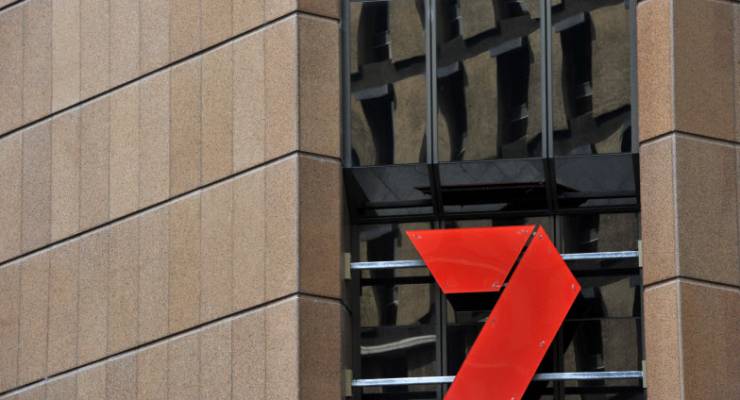
Debt-laden Seven West Media, 41% owned by Kerry Stokes Seven Group Holdings, is under growing pressure to raise fresh capital and cut costs in order to avoid repeating the disasters that unfolded at rival Ten Network Holdings.
A capital-raising of around $300 million would make a meaningful dent in Seven’s $795 million debt but the spectre of this is putting continuing pressure on the company’s share price as analysts ponder the appetite of controlling shareholder Kerry Stokes to sink any more of his wealth into a losing investment.
As it is, Seven West Media is facing the possibility of another round of asset impairments if the shares do not pick up.
Seven West revealed impairments and other losses of $988 million for 2016-17 and an overall loss of $744.3 million — but next Wednesday it will still pay a final 2c dividend, costing shareholders $30 million.
Seven’s shares hit a record low of 63c last Friday and closed at 64c last night — even as the broader sharemarket hit a three-month high.
Seven West Media shares are down 24.7% from their recent high of 85c on August 9, corresponding with some recent weakness in its ratings and the pending arrival of US powerhouse CBA as owner of rival Ten Network Holdings.
At 64c, Seven’s market value is $964 million, a fall of around $240 million from that August peak, which is part of Seven’s problem. As the share price falls, the margin contracts between the market cap and its huge $795 million of gross debt.
[How much debt is too much for Kerry Stokes?]
At the close yesterday, that margin was around $170 million, but supporting that book valuation is $1.02 billion of intangible assets, the equivalent of hot air in the current media market.
A year ago, the intangible assets were worth more than $1.55 billion. Those intangibles are still too high and Seven West Media’s board will potentially have to impair them again for this six-month period unless the share price picks up dramatically.
The combination of a weak share price, large debts, soft ratings and high book values for intangible assets is what trapped Ten, despite more than $500 million in a succession of capital-raisings over a five-year period during Lachlan Murdoch’s troubled reign.
Ten’s last dividend payment was 5.3c in November 2011, but it staggered on for another six years before collapsing.
Seven West Media paid a total dividend of 4c in 2016-17 and that may have to go next year if Seven is to convince lenders that it can survive with its current debt load.
Seven West will reject this contention, arguing that it has solid earnings and prospects, even in a declining industry like legacy media.
While earnings are expected to fall only 5% this year, Seven’s ratings have slumped worryingly in the past three months in the face of a strong recovery by Nine, which has had a number of higher rating programs.
The free-to-air advertising market may be in decline but the incumbents are still battling over a pie worth $3.6 billion in 2016-17.
After two recent billion-dollar acquisitions outside the media sector (Coates Hire and Lattice Energy), it is now a live question as to whether Kerry Stokes can or wants to put more cash into Seven West Media by supporting a capital-raising.
[Kerry Stokes pulls a Gerry Harvey on retail shareholders]
Seven Group recently raised $400 million from shareholders (Stokes did not participate) to boost its capital base and assure bankers that it can afford the $517 million takeover of the rest of Coates Hire (and its $1.084 billion in debt), and to support the $301 million equity-raising from Beach Energy for its $1.6 billion purchase of Lattice Energy.
Funnily enough, the problems confronting Seven (and to a lesser extent Nine) are well described in the independent expert’s report to Ten shareholders released this week by KPMG.
“It is important to recognise that in a declining market, without constant initiatives to reduce costs and/or increase market share, a business with a high fixed cost base or fixed increases in costs (as is the case with Ten Network currently) will experience a contraction in earnings margins. Over the last five and one half years, shareholders have invested $584 million in Ten Network. Although the content strategy introduced in November 2013 has resulted in improvements in revenue share, revenue and costs have increased at a similar rate, such that EBITDA remains negative. Furthermore, Ten Network’s revenue share remains significantly lower than those of its peers which provides a weaker negotiating position in terms of advertising revenues and lower economies of scale.”
With two well capitalised free-to-air rivals for the first time several years, Seven faces an uncertain future.
Debt remains the highest in the listed Australian-based media companies and its intangible assets of $1.019 billion are too high for the outlook it and the industry faces.
Does Kerry Stokes want to do something about this? After the recent sale of Seven Group’s 15% stake in Prime Media to Bruce Gordon, you get the impression that Stokes would exit the legacy media business if he could.
And with the media ownership laws poised to change, the only viable option to do this would be News Corp or the soon-to-listed Foxtel.
Once the court processes are completed and CBS has snapped up Ten, don’t be surprised if the Murdochs come knocking.
But this time it will be the real Murdoch, old man Rupert, not the eldest son Lachlan.
Stokes has never been regarded as a seller of Seven during his 23 years as chairman, but faced with an offer from News Corp or the prospect of sinking more money into recapitalising Seven West Media, there’s a fair chance he would opt for the former.







Very much appreciated. Great article. Info like this prompts me to subscribe.